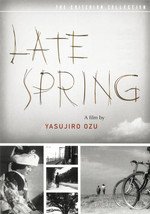Late Spring (1949)
November 25, 2015 8:17 PM - Subscribe
Noriko is twenty-seven years old and still living with her widowed father. Everybody tries to talk her into marrying, but Noriko wants to stay at home caring for her father.
In memoriam Setsuko Hara. Part of the Criterion On Hulu film club, Late Spring may be streamed by Hulu subscribers.
In memoriam Setsuko Hara. Part of the Criterion On Hulu film club, Late Spring may be streamed by Hulu subscribers.
I just realized I accidentally forgot to finish my thought. It should read, "In doing so, he showed the struggle of Japan itself in trying to honor the old ways while acknowledging the need for change."
posted by ob1quixote at 9:25 AM on November 29, 2015
posted by ob1quixote at 9:25 AM on November 29, 2015
You are not logged in, either login or create an account to post comments

Hara simply enchants the camera. The twinkle in her eye is expertly captured by Ozu. She also conveys her sadness with subtlety and grace. The scene in the Noh theatre is just masterful both in acting and direction.
Mainly due to censorship during the occupation, the war is mentioned as a thing that has happened but nothing is really revealed about how the characters feel about it. Noriko spent time in a labor camp, though it is only spoken of in passing. That does explain why she isn't anxious to marry and move out of her father's house.
The most interesting observation about the picture is the ubiquitous western fashions and furniture. Ozu explores a fascinating dichotomy between traditional and modern in this way. Shukichi sleeps and works in typical Japanese rooms and is most often shown in Japanese clothes. The young women, Noriko and her friend, played by Yumeji Tsukioka, are nearly always shown in western clothes and using western furniture.
As is pointed out at Film School Rejects this is also partially a function of the censors. They wanted modern and western and good to be synonymous. Ozu deftly used this to his advantage, playing Noriko's censor-approved, "individualistic," modern choices against what traditional society expected of her. In doing so, he showed
It's generally thought that the final scene shows Shukichi overcome with grief. I must admit that the first time I saw it, I thought he died.
posted by ob1quixote at 10:29 PM on November 25, 2015 [2 favorites]